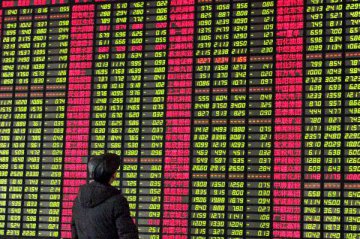The number of companies engaged in new economy which are listed in Hong Kong has reached a peak in recent several months after the smartphone maker Xiaomi became the first to go public in Hong Kong with dual-class shares structure. While in sharp contrast with the popularity in initial public offering (IPO), the secondary stock market in Hong Kong cooled down continuously. Hang Seng Index (HSI) hit a new low since this year on September 12. Southward capitals saw net outflow. Many enterprises including Xiaomi saw their value lower than listed prices. There’s widely concern that under background with continuous market adjustment, the wave of IPO may attract a great number of capitals, causing the companies in new economy to be stuck in the vicious cycle with stocks prices lower than listed prices.
。
Market participants thought that the listing of companies in new economy enriches the depth of Hong Kong’s capital market. The decline in listed prices of these companies was a result of higher valuation when going public. However, they boast huge development potential, which is good for market development in the long run.
Stuck in situation with prices lower than listed price
Enterprises in new economy flooded to be listed in Hong Kong this year after new listing systems like allowing dual-class shares structure were carried out. Statistics of Hong Kong Exchanges and Clearing (HKEx) showed that a total of 150 enterprises went public in Hong Kong during January and August, up by 46 from a year earlier. The companies totally raised 187.6 billion Hong Kong dollars through IPO, up by over 1.6 times year on year. Meituan Dianping, Haidilao, live box-office tracker Maoyan, Tubatu and Ludashi are also poised for Hong Kong IPOs. Based on this, the wave of going public in Hong Kong will keep going on.
The HKEx revising listing rules was the major reason why enterprises in new economy went public in Hong Kong, said Xu Hanhao, TMT analyst at Zhongtai International, to the reporter of China Securities Journal. The dual-class shares structure allows managers can hold certain controlling right after the company is listed, avoiding decrease in their holdings due to release of new shares, which will hence cause them to lose controlling right. Lin Sha, analyst with CIB Research, pointed out that the listing boom lately was driven by capital strain in primary market and enterprises’ appeal for growth.
。
However, these companies which are listed in Hong Kong cannot avoid the issue with declining listed prices in secondary market. Most of the Hong Kong-listed companies engaged in new economy are risk in such situation. Stock price of Xiaomi, listed on July 8, stood at 16.4 HK dollars per share, lower than the listed price of 17 HK dollars. Price of Inke Limited, which was listed at a price of 3.85 HK dollars per share, dropped to 2.88 HK dollars per share now.
Xu indicated that many projects have attracted market concerns. They must offer higher valuation if they want to be outstanding among other private funds. At the same time, a lot of large companies enjoyed excellent performance in the past. Therefore, the private funds will have higher valuation for the companies. But investors in Hong Kong stock market focus more on profitability and cashability of companies, so it is difficult for valuation bubble to last long. Corporate earnings failing to back the much higher valuation were the major cause for selloff.
Wang Shizhen, head of investment research at Harmony Capital Group, said that there’s not much relation between decreasing listed prices and whether the companies serve in new economy. The point is these companies which were listed earlier came to the higher valuation trend. Market adjustment also imposed pressure on stock price.
Change ecology of Hong Kong stocks
On the whole, the new listing systems in HKEx can better meet listing demands of different kinds of new-economy enterprises with different appeals. For investors, how to embrace the all-new Hong Kong stock market is also a big challenge. After all, finance and real estate stocks in the Hong Kong stocks had clearer profitability model and financial data in the past. Different from this fact, investors would like to focus more on the growth of new-economy enterprises. Most companies, in fact, are still suffering loss. Many institutional investors can hardly accept these companies’ growth logics in the short term.
Whether will the listing of a great number of new-economy enterprises pull out capitals and be stuck in vicious cycle? Wang believed that a bunch of new-economy companies going public together in the short term will certainly drain market capitals. But Hong Kong market itself is an open offshore market. In the long term, liquidity of emerging markets is more influenced by allocation of global institutional investors, and new-economy enterprises will be new highlight of Hong Kong stock market.
“Investors in primary market usually have a longer-term view. It is difficult for them to hold stocks in secondary market in the long run due to its larger fluctuation and assessment period. New-economy companies are generally in early development stage of commercialization. They need to eye on market potential and core competitiveness in the long run instead of short-term profits. This is the value of such companies.” In the opinion of Wang, increasing number of new-economy companies will enrich ecology of Hong Kong’s capital market, including variety of listing companies and investors, and change the pattern of Hong Kong market which mainly centered on traditional finance and real estate industries before.
Translated by Vanessa Chan
。
Market participants thought that the listing of companies in new economy enriches the depth of Hong Kong’s capital market. The decline in listed prices of these companies was a result of higher valuation when going public. However, they boast huge development potential, which is good for market development in the long run.
Stuck in situation with prices lower than listed price
Enterprises in new economy flooded to be listed in Hong Kong this year after new listing systems like allowing dual-class shares structure were carried out. Statistics of Hong Kong Exchanges and Clearing (HKEx) showed that a total of 150 enterprises went public in Hong Kong during January and August, up by 46 from a year earlier. The companies totally raised 187.6 billion Hong Kong dollars through IPO, up by over 1.6 times year on year. Meituan Dianping, Haidilao, live box-office tracker Maoyan, Tubatu and Ludashi are also poised for Hong Kong IPOs. Based on this, the wave of going public in Hong Kong will keep going on.
The HKEx revising listing rules was the major reason why enterprises in new economy went public in Hong Kong, said Xu Hanhao, TMT analyst at Zhongtai International, to the reporter of China Securities Journal. The dual-class shares structure allows managers can hold certain controlling right after the company is listed, avoiding decrease in their holdings due to release of new shares, which will hence cause them to lose controlling right. Lin Sha, analyst with CIB Research, pointed out that the listing boom lately was driven by capital strain in primary market and enterprises’ appeal for growth.
。
However, these companies which are listed in Hong Kong cannot avoid the issue with declining listed prices in secondary market. Most of the Hong Kong-listed companies engaged in new economy are risk in such situation. Stock price of Xiaomi, listed on July 8, stood at 16.4 HK dollars per share, lower than the listed price of 17 HK dollars. Price of Inke Limited, which was listed at a price of 3.85 HK dollars per share, dropped to 2.88 HK dollars per share now.
Xu indicated that many projects have attracted market concerns. They must offer higher valuation if they want to be outstanding among other private funds. At the same time, a lot of large companies enjoyed excellent performance in the past. Therefore, the private funds will have higher valuation for the companies. But investors in Hong Kong stock market focus more on profitability and cashability of companies, so it is difficult for valuation bubble to last long. Corporate earnings failing to back the much higher valuation were the major cause for selloff.
Wang Shizhen, head of investment research at Harmony Capital Group, said that there’s not much relation between decreasing listed prices and whether the companies serve in new economy. The point is these companies which were listed earlier came to the higher valuation trend. Market adjustment also imposed pressure on stock price.
Change ecology of Hong Kong stocks
On the whole, the new listing systems in HKEx can better meet listing demands of different kinds of new-economy enterprises with different appeals. For investors, how to embrace the all-new Hong Kong stock market is also a big challenge. After all, finance and real estate stocks in the Hong Kong stocks had clearer profitability model and financial data in the past. Different from this fact, investors would like to focus more on the growth of new-economy enterprises. Most companies, in fact, are still suffering loss. Many institutional investors can hardly accept these companies’ growth logics in the short term.
Whether will the listing of a great number of new-economy enterprises pull out capitals and be stuck in vicious cycle? Wang believed that a bunch of new-economy companies going public together in the short term will certainly drain market capitals. But Hong Kong market itself is an open offshore market. In the long term, liquidity of emerging markets is more influenced by allocation of global institutional investors, and new-economy enterprises will be new highlight of Hong Kong stock market.
“Investors in primary market usually have a longer-term view. It is difficult for them to hold stocks in secondary market in the long run due to its larger fluctuation and assessment period. New-economy companies are generally in early development stage of commercialization. They need to eye on market potential and core competitiveness in the long run instead of short-term profits. This is the value of such companies.” In the opinion of Wang, increasing number of new-economy companies will enrich ecology of Hong Kong’s capital market, including variety of listing companies and investors, and change the pattern of Hong Kong market which mainly centered on traditional finance and real estate industries before.
Translated by Vanessa Chan





















Latest comments